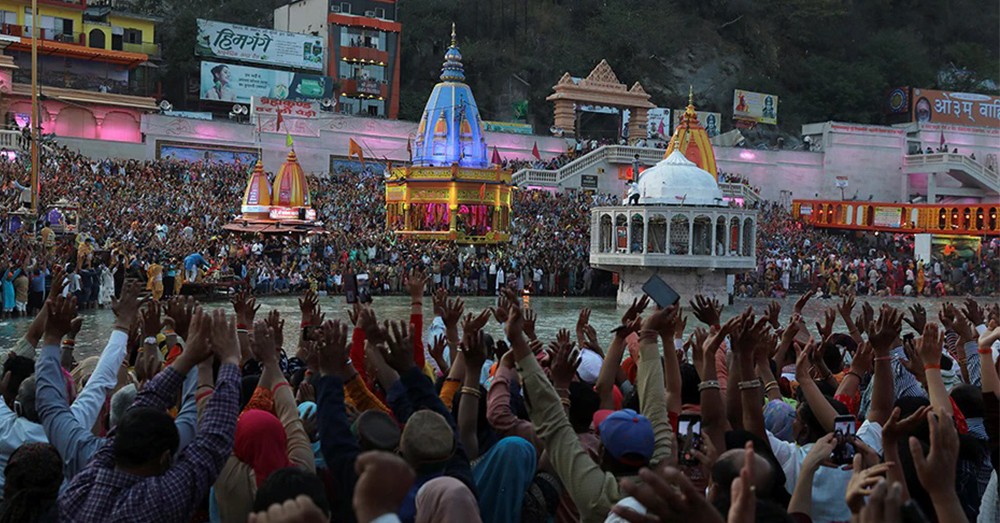Several million Hindus have gathered to take a dip in the Ganges river as a deadly second Covid-19 wave continues to sweep India.
The devotees are marking an auspicious bathing day on Monday at the Kumbh Mela religious festival in Haridwar city in the Himalayan state of Uttarakhand.
Officials say they are struggling to impose safety norms due to huge crowds.
Hindus believe the river is holy and bathing in it will cleanse them of their sins and bring salvation.
The Kumbh Mela takes place every 12 years and the venue is chosen from amongst four cities, including Allahabad, Haridwar, Nasik and Ujjain.
Haridwar's turn to host the gathering came amid a sharp rise in the number of coronavirus infections, with India consistently reporting more than 100,000 cases daily in the past few weeks.
Several million Hindus have gathered to take a dip in the Ganges river as a deadly second Covid-19 wave continues to sweep India.
The devotees are marking an auspicious bathing day on Monday at the Kumbh Mela religious festival in Haridwar city in the Himalayan state of Uttarakhand.
Officials say they are struggling to impose safety norms due to huge crowds.
Hindus believe the river is holy and bathing in it will cleanse them of their sins and bring salvation.
The Kumbh Mela takes place every 12 years and the venue is chosen from amongst four cities, including Allahabad, Haridwar, Nasik and Ujjain.
Haridwar's turn to host the gathering came amid a sharp rise in the number of coronavirus infections, with India consistently reporting more than 100,000 cases daily in the past few weeks.
A senior police official told ANI news agency that it was very difficult to ensure social distancing on the river banks.
"We are continuously appealing to people to follow Covid-appropriate behaviour. But due to the huge crowd, it is practically not possible to issue challans [fines]," inspector general of police Sanjay Gunjyal said.
He said that a "stampede-like situation" could arise if the police tried to enforce social distancing on the river banks.
Officials said by noon more than 2.1 million devotees had bathed in the river, with many more expected to follow suit. Monday - Somvati Amavasya - marks the biggest bathing day during the two-month-long festival.
The government had earlier said that only people with Covid negative reports would be allowed at the festival and strict measures like social distancing would be followed.
But a number of people, including top saints, have already tested positive.
This has given rise to fears that Monday's bathing day will help the infection spread faster among the devotees and that some of them could also take the virus back to their cities and villages in other parts of the country.
The second wave is wreaking havoc across India. Reports of a shortage of hospital beds and life-saving drugs have started coming in from different parts of the country.
The state of Maharashtra is particularly affected - accounting for an average of almost 30-40% of daily cases. Measures like night curfews and limited lockdowns have been taken but the green light given to the Kumbh Mela festival has baffled experts.
Some of them say that the worst is yet to come unless strict, urgent measures are taken, and that includes ramping up vaccinations.
India has given more than 100 million doses so far but the pace needs to further pick up to halt the spread of the virus, experts say.
Share This Post















